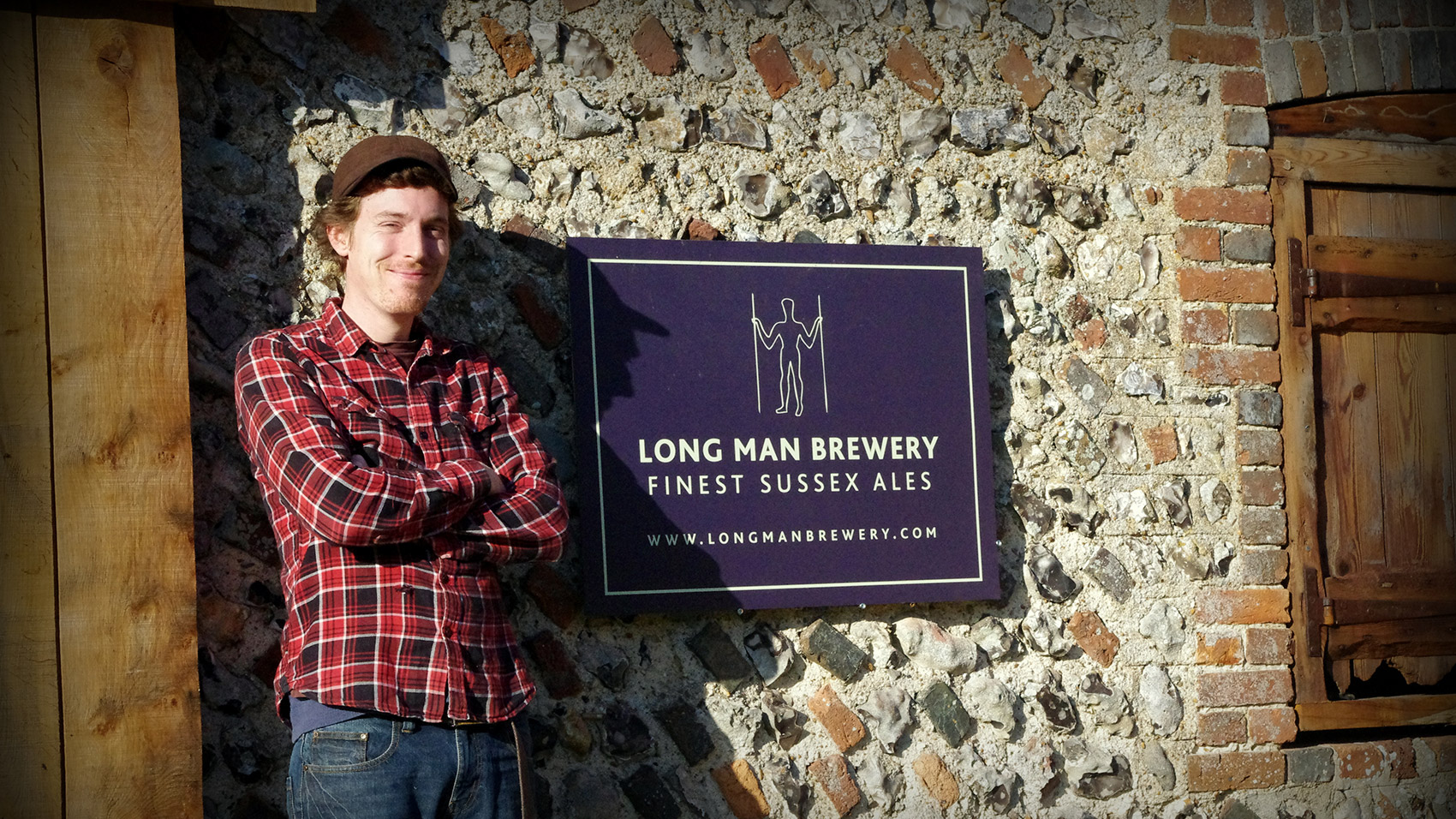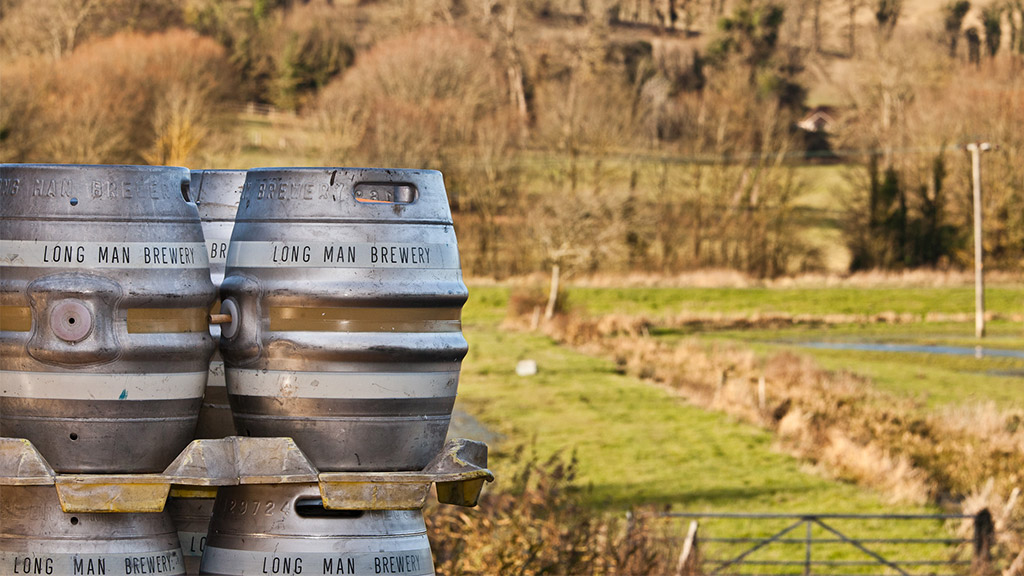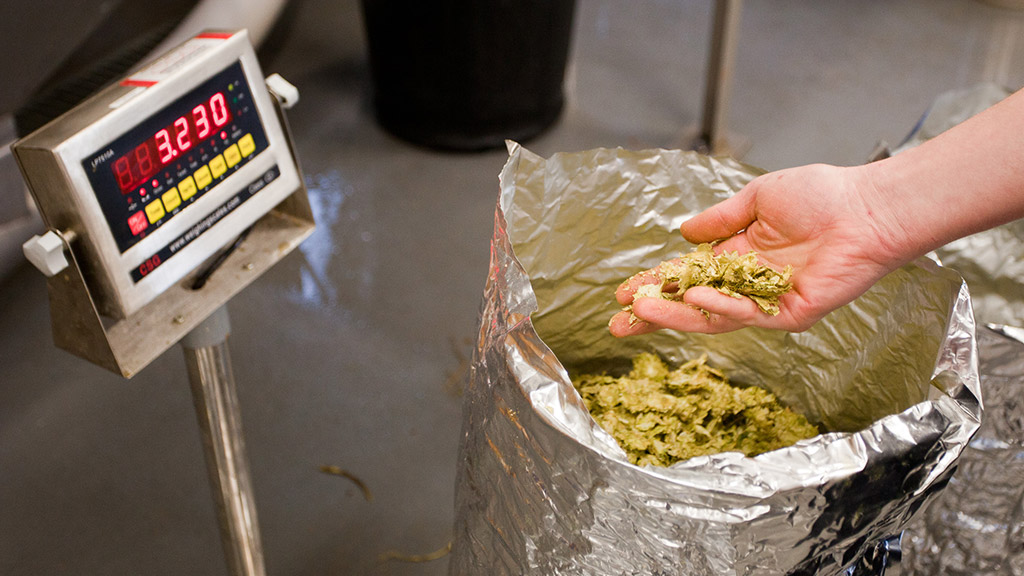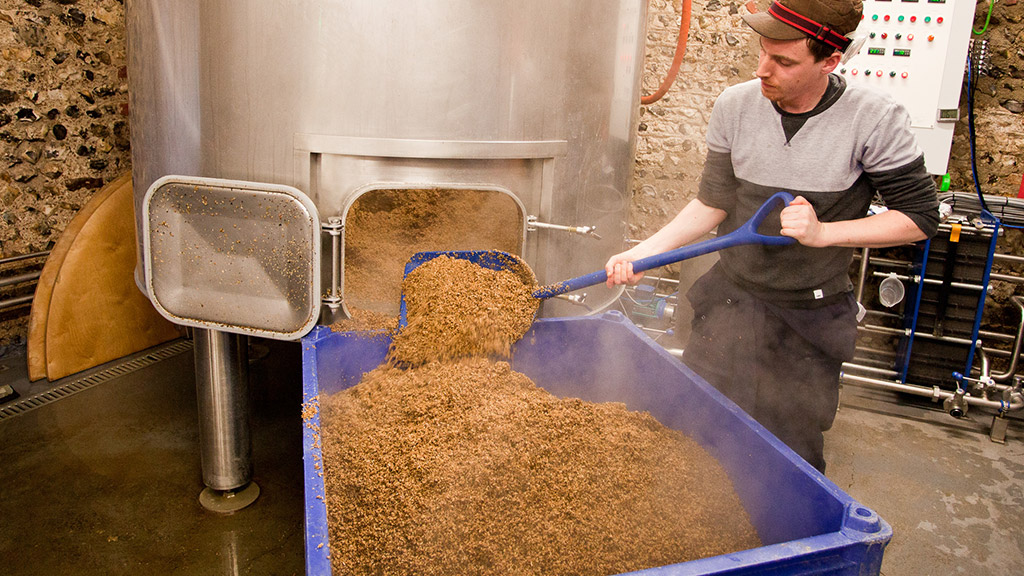When Church Farm said goodbye to its dairy herd 10 years ago, Duncan Ellis thought he’d seen the back of 4am starts for good.
But now you’ll find him up before dawn managing another liquid asset – and the return on investment on this one is considerably better than milk.
Five years ago, having turned down countless approaches to convert his redundant dairy buildings into highly desirable office accommodation, Duncan opened a brewery.
“I hadn’t been looking to start a brewery, but I got chatting to a chap at a village party to celebrate the wedding of William and Kate and he suggested I turn my malting barley into beer,” says Duncan, who was already farming 728 hectares (1,800 acres) of combinable crops with beef and sheep on a further 607ha (1,500 acres) of grass near the Long Man of Wilmington – a fertility symbol carved into the Sussex Downs which would become synonymous with a string of award-winning ales.
The fact the stranger who planted the seed of the idea for Long Man Brewery turned out to be Steve Lees, commercial director of the locally based specialist drinks distributor H.T. White, turned what could have been a fanciful idea into a no-brainer, since Duncan knew one of the biggest challengers to farm-based breweries is the cost of transporting barrel loads of beer.
While most find it a challenge to establish a brand locally, let alone nationally, Long Man rapidly went to eight brews a week and 2.5 million pints a year – half of them sold outside of Sussex.
“The key to our success was being plugged in to a drinks distribution business with 30 lorries on the road from the outset,” says Duncan. “But even then it’s gone far faster and far harder than I ever anticipated.”
Creative
A self-confessed ‘session drinker’ whose taste in beer was influenced by three years studying agriculture at Newcastle University in the heart of ‘Broon Dog’ country, Duncan recruited head brewer Jamie Simm to be the creative genius behind Long Man even before the paint was dry on the brewery walls.
Previously with the award-winning Royal Tunbridge Wells Brewery, Kent, he was intrigued by the chance to influence production all the way from plough to pint.
Jamie says: “Not only does it offer a level of control which only a handful of other brewers have, but it is also environmentally sustainable. Ultimately, the choice of variety is Duncan’s to make and I certainly wouldn’t tell a third generation farmer how to grow it, but he does involve me and we do regularly inspect the fields together. I can literally jump in the car and drive up to take a look at the barley, and we do.”
Now a partner in the business with Duncan and Steve Lees, he steered Long Man to success in last year’s Beer Awards, where all four of the beers entered came away with medals to add to the hat-trick the brewery picked up at the International Beer Challenge a month earlier.
This year, it’s aiming for the beer Oscars, the International Brewing Awards, held every two years, where it will come up against some of the best in the world.
Although the brand was deliberately designed to appeal to the biggest bandwidth of drinkers, maintaining quality is a deceptively skilful task.
Jamie says: “To begin with, I focused on producing the beers which would help establish the brand – best bitter, pale ales, etc. Now I hope Long Man is known for producing quality cask ales, most of which are fairly traditional ‘cooking’ bitters. This is something I am very proud of because the key to well-executed beers like these is balance.
“The weird and wacky are good at winning awards and making a lot of noise, but with the traditional session beers like ours, there’s no place to hide.”
About 20 per cent (100 tonnes) of all the Propino spring malting barley produced on-farm goes into Long Man beers.
Such hyper-local provenance is a big part of the brewery’s marketing story, which is becoming increasingly important if they are to realise their ambition of becoming a national and even international brand.
Carving out a space for the nine beers which the brewery has so far produced among the 11,000 or so real ales shouting for attention in the UK is no easy task, although the 19 awards they have already lifted helps.
Loyalty
“People want to go to a pub to experience new beers, but a permanent stockist is what every brewer, including us, is after,” says Duncan.
Winning this loyalty is tough, which is why the brewery has invested in state-of-the art equipment designed with visits from trade customers in mind. This is also why, however big they grow, they’ll keep the very first brew-house they installed in the historic flint barn with its stunning views of the Cuckmere Valley.
Duncan says: “We grow the barley, feed livestock the spent grains and the brewery is powered by 25kW solar system on top of the grain store. We also have a bore hole from which we draw water.”
Waste water left over from a natural filtration system gets pumped back onto the fields.
This is the sustainable story the drinking public hears, but Duncan’s stewardship of the land underpinning the Long Man brand goes deeper.
About 10 years ago, the farm began experimenting with minimum till on the heavier clay soils to improve their structure.
“Conservation agriculture is what I’m driving for now,” says Duncan. “I’m convinced it’s right and I’m trying to convince others. Soil structure, together with rotation, is crucial if we want a healthy farm we can hand down.”
It’s important, he says, to stay focused on the ‘day job’ while allowing the brewery staff to get on with creating and selling great beer.
Even before Long Man’s launch, a queue of well-qualified professionals keen to become involved in the business was forming at the door.
The brewery has created 14 in the past five years – seven times more than the £50,000 of LEADER funding which the farm secured required. In fact, Long Man has over-delivered on expectation in every respect.
Story
“We knew we could sell the beer and we knew we had a good story. We’ve just got to get even better at telling it,” says Duncan.
He doesn’t underestimate the challenges facing the independent sector, from big breweries muscling in on ‘craft beers’, to the unstoppable tide of pub closures and a tax system which seems determined to punish the British pint.
Despite recent reforms, it will take years to undo the damage done by progressive taxation which saw beer duty increase by 42 per cent between 2008 and 2013, while beer consumption fell by 16 per cent and 7,000 pubs closed. And yet breweries are opening in the UK faster than at any time since the 1930s.
Jamie says: “Our main challenge now is the competition. Although I see this as a good thing for the industry, you can’t open the paper or turn on the radio these days without hearing about a new brewery opening, so it’s definitely got tougher – hence the importance of our farm story. Still, tax on beer is too high and the pub sector really needs help.”
Breweries have been shown to have one of the highest business survival rates of any farm diversification, but as the market gets tougher, will this continue to be the case?
Original source: https://www.fginsight.com/vip/vip/sussex-farmer-brewing-up-a-storm–18381





